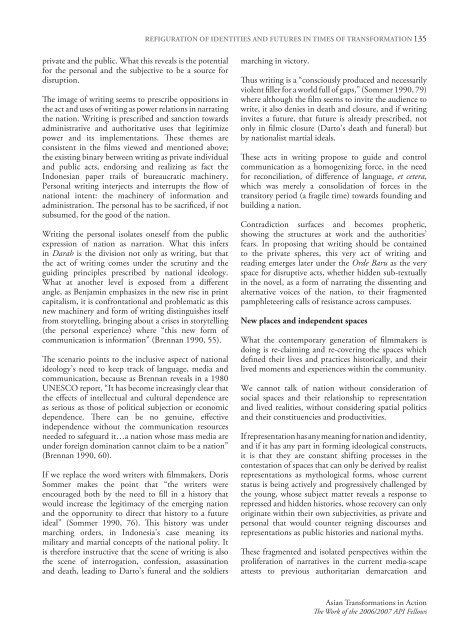Asian Transformations in Action - Api-fellowships.org
Asian Transformations in Action - Api-fellowships.org
Asian Transformations in Action - Api-fellowships.org
Create successful ePaper yourself
Turn your PDF publications into a flip-book with our unique Google optimized e-Paper software.
REFIGURATION OF IDENTITIES AND FUTURES IN TIMES OF TRANSFORMATION 135private and the public. What this reveals is the potentialfor the personal and the subjective to be a source fordisruption.The image of writ<strong>in</strong>g seems to prescribe oppositions <strong>in</strong>the act and uses of writ<strong>in</strong>g as power relations <strong>in</strong> narrat<strong>in</strong>gthe nation. Writ<strong>in</strong>g is prescribed and sanction towardsadm<strong>in</strong>istrative and authoritative uses that legitimizepower and its implementations. These themes areconsistent <strong>in</strong> the films viewed and mentioned above;the exist<strong>in</strong>g b<strong>in</strong>ary between writ<strong>in</strong>g as private <strong>in</strong>dividualand public acts, endors<strong>in</strong>g and realiz<strong>in</strong>g as fact theIndonesian paper trails of bureaucratic mach<strong>in</strong>ery.Personal writ<strong>in</strong>g <strong>in</strong>terjects and <strong>in</strong>terrupts the flow ofnational <strong>in</strong>tent: the mach<strong>in</strong>ery of <strong>in</strong>formation andadm<strong>in</strong>istration. The personal has to be sacrificed, if notsubsumed, for the good of the nation.Writ<strong>in</strong>g the personal isolates oneself from the publicexpression of nation as narration. What this <strong>in</strong>fers<strong>in</strong> Darah is the division not only as writ<strong>in</strong>g, but thatthe act of writ<strong>in</strong>g comes under the scrut<strong>in</strong>y and theguid<strong>in</strong>g pr<strong>in</strong>ciples prescribed by national ideology.What at another level is exposed from a differentangle, as Benjam<strong>in</strong> emphasizes <strong>in</strong> the new rise <strong>in</strong> pr<strong>in</strong>tcapitalism, it is confrontational and problematic as thisnew mach<strong>in</strong>ery and form of writ<strong>in</strong>g dist<strong>in</strong>guishes itselffrom storytell<strong>in</strong>g, br<strong>in</strong>g<strong>in</strong>g about a crises <strong>in</strong> storytell<strong>in</strong>g(the personal experience) where “this new form ofcommunication is <strong>in</strong>formation” (Brennan 1990, 55).The scenario po<strong>in</strong>ts to the <strong>in</strong>clusive aspect of nationalideology’s need to keep track of language, media andcommunication, because as Brennan reveals <strong>in</strong> a 1980UNESCO report, “It has become <strong>in</strong>creas<strong>in</strong>gly clear thatthe effects of <strong>in</strong>tellectual and cultural dependence areas serious as those of political subjection or economicdependence. There can be no genu<strong>in</strong>e, effective<strong>in</strong>dependence without the communication resourcesneeded to safeguard it…a nation whose mass media areunder foreign dom<strong>in</strong>ation cannot claim to be a nation”(Brennan 1990, 60).If we replace the word writers with filmmakers, DorisSommer makes the po<strong>in</strong>t that “the writers wereencouraged both by the need to fill <strong>in</strong> a history thatwould <strong>in</strong>crease the legitimacy of the emerg<strong>in</strong>g nationand the opportunity to direct that history to a futureideal” (Sommer 1990, 76). This history was undermarch<strong>in</strong>g orders, <strong>in</strong> Indonesia’s case mean<strong>in</strong>g itsmilitary and martial concepts of the national polity. Itis therefore <strong>in</strong>structive that the scene of writ<strong>in</strong>g is alsothe scene of <strong>in</strong>terrogation, confession, assass<strong>in</strong>ationand death, lead<strong>in</strong>g to Darto’s funeral and the soldiersmarch<strong>in</strong>g <strong>in</strong> victory.Thus writ<strong>in</strong>g is a “consciously produced and necessarilyviolent filler for a world full of gaps,” (Sommer 1990, 79)where although the film seems to <strong>in</strong>vite the audience towrite, it also denies <strong>in</strong> death and closure, and if writ<strong>in</strong>g<strong>in</strong>vites a future, that future is already prescribed, notonly <strong>in</strong> filmic closure (Darto’s death and funeral) butby nationalist martial ideals.These acts <strong>in</strong> writ<strong>in</strong>g propose to guide and controlcommunication as a homogeniz<strong>in</strong>g force, <strong>in</strong> the needfor reconciliation, of difference of language, et cetera,which was merely a consolidation of forces <strong>in</strong> thetransitory period (a fragile time) towards found<strong>in</strong>g andbuild<strong>in</strong>g a nation.Contradiction surfaces and becomes prophetic,show<strong>in</strong>g the structures at work and the authorities’fears. In propos<strong>in</strong>g that writ<strong>in</strong>g should be conta<strong>in</strong>edto the private spheres, this very act of writ<strong>in</strong>g andread<strong>in</strong>g emerges later under the Orde Baru as the veryspace for disruptive acts, whether hidden sub-textually<strong>in</strong> the novel, as a form of narrat<strong>in</strong>g the dissent<strong>in</strong>g andalternative voices of the nation, to their fragmentedpamphleteer<strong>in</strong>g calls of resistance across campuses.New places and <strong>in</strong>dependent spacesWhat the contemporary generation of filmmakers isdo<strong>in</strong>g is re-claim<strong>in</strong>g and re-cover<strong>in</strong>g the spaces whichdef<strong>in</strong>ed their lives and practices historically, and theirlived moments and experiences with<strong>in</strong> the community.We cannot talk of nation without consideration ofsocial spaces and their relationship to representationand lived realities, without consider<strong>in</strong>g spatial politicsand their constituencies and productivities.If representation has any mean<strong>in</strong>g for nation and identity,and if it has any part <strong>in</strong> form<strong>in</strong>g ideological constructs,it is that they are constant shift<strong>in</strong>g processes <strong>in</strong> thecontestation of spaces that can only be derived by realistrepresentations as mythological forms, whose currentstatus is be<strong>in</strong>g actively and progressively challenged bythe young, whose subject matter reveals a response torepressed and hidden histories, whose recovery can onlyorig<strong>in</strong>ate with<strong>in</strong> their own subjectivities, as private andpersonal that would counter reign<strong>in</strong>g discourses andrepresentations as public histories and national myths.These fragmented and isolated perspectives with<strong>in</strong> theproliferation of narratives <strong>in</strong> the current media-scapeattests to previous authoritarian demarcation and<strong>Asian</strong> <strong>Transformations</strong> <strong>in</strong> <strong>Action</strong>The Work of the 2006/2007 API Fellows
















